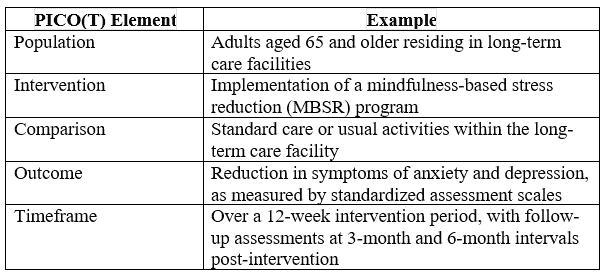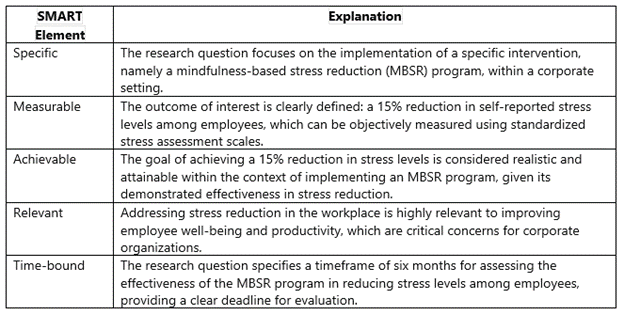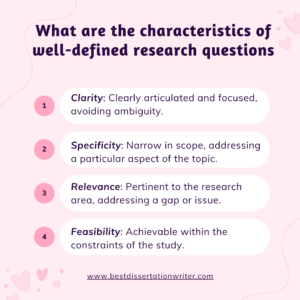Ultimate Guide: How to Write a Research Question, Examples
Unlock your academic potential with our expert dissertation and thesis writing services! Our team of seasoned writers has meticulously formulated top-tier research questions and topics tailored to your needs. Place your order now and let our expertise guide you to success!
What is a STRONG research question
A strong and effective research question plays a crucial role in the success of a research paper. A broad topic can be narrowed down and focused through the development of specific research question.
For quantitative research, the first research question may focus on numbers and measurements, while the second question could delve into the reasons behind the data. You should choose a research topic that can be analyzed quantitatively.
On the other hand, qualitative research questions seek to understand experiences and perspectives. Therefore, qualitative research includes descriptive research questions that provide details and explanations, and such research questions must be specific to the problem under investigation.
Therefore, there are specific considerations that should be applied when developing both quantitative and qualitative research questions.
Importance of a good research question
Good or clear research questions are clear, concise, and well-defined, ensuring that the study remains focused and manageable. Developing research questions is a critical step in the preliminary research writing. They should be formulated in a way that allows for empirical investigation and data collection, often leading to the generation of new knowledge or insights.
Good research questions can vary in complexity and scope, ranging from broad inquiries that explore overarching concepts to more narrowly focused queries that examine specific aspects of a phenomenon. These questions guide your research paper writing process, research and writing. They play a crucial role in guiding the research process, shaping the design of the study, the collection and analysis of data, and the interpretation of findings.
Unlock your academic potential with our expert dissertation and thesis writing services! Our team of seasoned writers has meticulously formulated top-tier research questions and topics tailored to your needs. Place your order now and let our expertise guide you to success!
How to create a research question
To create a research question, identify your topic or research problem, review existing literature, pinpoint gaps or areas of interest, formulate a clear, focused question, ensure it’s feasible and relevant to your field.
To create a quantitative research question, specify dependent and independent variables of interest, determine the relationship or effect to be measured, ensure clarity and measurability, and formulate the question using precise language and numerical terms.
To develop a qualitative research question, focus on exploring experiences, perceptions, or meanings, frame an open-ended question, consider context and complexity. Therefore, this type of research question often ensures relevance to the research aims, and prioritize depth over breadth.
Types of research questions in academic writing
-
Descriptive Research Questions:
- These questions aim to describe the characteristics or phenomena under study.
- Example: What are the demographic characteristics of participants in a certain population?
-
Exploratory Research Questions:
- These questions seek to explore a relatively unknown or poorly understood area.
- Example: What are the potential factors contributing to the decline in bee populations?
-
Explanatory Research Questions:
- These questions aim to explain the relationship between variables or phenomena.
- Example: How does parental involvement affect academic achievement in elementary school students?
Frameworks for writing a research question
There are different frameworks that you can use for developing your research questions for various research projects such as dissertations and theses.
PICO(T) Framework
The PICO(T) framework for formulating research question is often used in clinical research and stands for Population, Intervention, Comparison, Outcome, and Timeframe.
It helps researchers define specific elements of a study, such as the target population, the intervention being studied, the comparison group, the desired outcomes, and the timeframe over which the study will take place.
Look at some examples of research question developed using the PICO(T) framework:

SPIDER Framework
The SPIDER framework for formulating research question stands for Sample, Phenomenon of Interest, Design, Evaluation, and Research type.
This framework is particularly useful for qualitative research studies, helping researchers specify the sample population, the phenomenon under investigation, the study design, the evaluation criteria, and the type of research being conducted.
Here is an example of research question developed using the SPIDER framework:

SWOT Framework
The SWOT framework for formulating research question stands for Strengths, Weaknesses, Opportunities, and Threats. This framework helps researchers identify key factors affecting a particular research topic or area, enabling them to formulate research questions that address potential strengths and weaknesses while leveraging opportunities and mitigating threats.
Example of a research question include:
SWOT Analysis of Online Learning in Higher Education: A Qualitative Investigation
SMART Framework
SMART stands for Specific, Measurable, Achievable, Relevant, and Time-bound. While primarily used for goal setting, this framework can also be adapted for formulating research questions. In this approach, research questions aim to improve precision of the research problem under investigation.
Here is an example of a potential research questions developed using the SMART framework:
Topic: Workplace Stress and Employee Productivity
SMART Research Question
Can the implementation of a mindfulness-based stress reduction (MBSR) program within a corporate setting lead to a 15% reduction in self-reported stress levels among employees, as measured by standardized stress assessment scales, within six months of program initiation?

Conceptual Framework
In some cases, researchers may develop conceptual frameworks specific to their research topic or area of study. These frameworks outline the key concepts, theories, and relationships relevant to the research, guiding the formulation of research questions that align with the underlying theoretical framework.
Here is one with examples of a research question developed using a conceptual framework:
Conceptual Framework: Social Cognitive Theory
Research Question Example
How does self-efficacy, outcome expectations, and social support influence adolescents’ engagement in physical activity, and what are the implications for designing effective interventions to promote physical activity among adolescents?
Unlock your academic potential with our expert dissertation and thesis writing services! Our team of seasoned writers has meticulously formulated top-tier research questions and topics tailored to your needs. Place your order now and let our expertise guide you to success!
Good and bad research question examples
Examples of Good and Bad Research Questions
Here are examples of a good and a bad research question about the impacts of social media marketing on consumer perceptions:
Good Research Question
Topic: Impacts of Social Media Marketing on Consumer Perceptions
Good Research Question:
“What are the key factors influencing consumer perceptions of brand authenticity in social media marketing campaigns, and how do these perceptions affect purchase intentions and brand loyalty among millennial consumers in the fashion industry?”
Explanation:
This research question is specific, relevant, and focused on a particular aspect of social media marketing (brand authenticity) and its impact on consumer perceptions and behavior. It clearly defines the target population (millennial consumers in the fashion industry) and the variables of interest (perceptions of brand authenticity, purchase intentions, and brand loyalty). Additionally, it addresses an important and timely issue concerning the effectiveness of social media marketing strategies in influencing consumer behavior.
Bad Research Question
Topic: Social Media Marketing
Bad Research Question:
“How does social media marketing impact consumer perceptions?”
Explanation: This research question is question is not focused enough and lacks specificity. It does not define the scope of the study or provide a clear focus for inquiry. Additionally, it does not specify the target population or the variables of interest, the question is too broad making it difficult to conduct meaningful research. A good research question should be specific, focused, and capable of generating new knowledge or insights within a particular context or industry.
Unlock your academic potential with our expert dissertation and thesis writing services! Our team of seasoned writers has meticulously formulated top-tier research questions and topics tailored to your needs. Place your order now and let our expertise guide you to success!
Frequently Asked Questions: How to Write a Research Question
1. What is a research question?
A research question is a concise, focused, and clear inquiry that guides your research process. It defines the main goal of your study and helps in creating a structured approach towards your research topic.
2. Why is it important to write a good research question?
Having a good research question is crucial as it forms the foundation of your research project. It helps in narrowing down your focus, guiding your investigations, and ensuring that your research is meaningful and relevant.
3. How can I write a strong research question?
To craft a strong research question, it should be clear, concise, and specific. Make sure it is relevant to your research topic, answerable, and sets the direction for your study.
4. Can you provide some examples of research questions?
Here are some research question examples:
- Qualitative research question: How do individuals experience grief after the loss of a loved one?
- Quantitative research question: What is the impact of technology on students’ academic performance?
5. What are the types of research questions?
Types of research questions can be broadly categorized as qualitative and quantitative. Qualitative questions focus on understanding behaviors and experiences, while quantitative questions involve measurable data and statistical analysis.
6. How do research questions guide your research?
Research questions aim to guide your study by providing a specific focus, identifying the research problem, and outlining the objectives of your research. They ensure that your study remains on track and helps in achieving your research goals.
7. What are the key elements of developing research questions?
When developing research questions, consider that they must be clear, specific, and relevant to your research topic. They should address a research problem, be feasible to answer, and contribute to the existing body of knowledge.
8. Why is a specific research question essential?
A specific research question is essential as it provides clarity on what you aim to investigate. It helps in focusing your research efforts, framing your study, and ensuring that your findings are precise and insightful.

